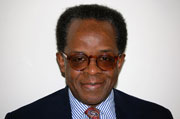
Our Inevitable, everlasting ‘racial divide’
By Lee A. Daniels NNPA Columnist
The flurry of polls released last week revealed that sharp disagreements exist between Black and white Americans about the killing of Michael Brown by a white police officer in Ferguson, Mo. on Aug. 9, 2014 about the street protests that have followed, and about several issues of how police interact with civilians.
In surveys conducted by, among others, the Pew Research Center for the People & the Press, by the New York Times and CBS, by the Huffington Post and YouGov, by the Washington Post, and by the Gallup Organization, Blacks were much more likely than whites to: declare that the shooting of Michael Brown was unjustified; support President Obama’s response to the killing and the protests; believe that the incident raises important racial issues; be sharply critical of the conduct of the Ferguson police since the shooting; and have little confidence in the subsequent local and state investigations.
All of which, of course, recalls the racial divides of similar or greater dimensions over the Trayvon Martin killing, trial and verdict; over the Jordan Davis killing, trial and verdict, and on and on all the way back down the well of America’s tangled racial history.
But, don’t get me wrong. I’m not one for wringing my hands at the latest display of our racial divide. Indeed, one cannot expect otherwise of a nation founded and maintained for so long on the stark “racial divide” of Negro Slavery and then a pervasive, brutal legalized segregation that lasted deep into the 20th century. Hallelujah for all the progress that’s been made since the 1960s, though a raft of data show a massive backsliding on the economic progress Blacks made in the 1990s. But a stark “racial divide” on numerous serious questions remains just as it was in the 1960s: as American as apple pie.
And, just as was the case in the 1960s, our stark racial divide on these issues is white America’s doing. Or rather, to be precise, it’s the doing of a diminishing but still significant segment of white Americans who resent the expansion of opportunity to Blacks, other Americans of color, women and gays and lesbians. In that regard, it’s very much worth noting that the Pew survey found that 62 percent of white Democrats also believe the Brown killing raises important racial issues – while 61 percent of white Republicans claim it does not.
There’s a great deal about the surveys’ findings that make them all worth pondering. So, too, does one extraordinary event that occurred last week outside of Ferguson that should be used as “reference reading” to them.
That event involved a Kansas City Police Officer, Marc Catron, who, to support the Ferguson Police Officer Darren Wilson, posted a photo of someone he thought was Michael Brown on his Facebook page.
But it was the wrong ni**er.
I’ve used the word ni??er here because it represents the vile compulsion that drove Catron to do what he did: He wanted to strike out at the figment – the ni??er – of his racist imagination. And so he Facebook-posted a photo of a Black youth he thought was Michael Brown. It showed a young Black man with a wad of dollar bills in his mouth and a smug look on his face, pointing a gun at the camera. Catron then wrote beneath it this caption: “I’m sure Michael Brown is innocent and just misunderstood. I’m sure he is a pillar of the Ferguson community.”
However, the person in the photo wasn’t Michael Brown, but a 20-something Black Oregon resident who’s now under arrest for a vicious murder.
Marc Catron’s mistake was the more revealing because police officers, one would think, are trained to see far better than ordinary civilians individuals’ distinguishing facial and bodily features. That Catron didn’t make the distinction indicates he really wasn’t using his eyes to search for a photo of Michael Brown. Instead, he subconsciously fastened on a photo of a Black youth who “fit” his racist imagination.
In other words, Catron’s “mistake” exemplifies, as even a cursory scan of conservative opinion columns and conservative reader responses in the blogosphere shows, several themes of the “old” racist impulse that rise to the surface every time White police officers unjustifiably beat or kill Blacks in questionable circumstances: The most important of these involves criminalizing not only the victim but also Blacks as a group, while declaring the perpetrator of the violence as the victim.
Fiercely challenging that kind of a response is worth being “divided” over.




Be the first to comment